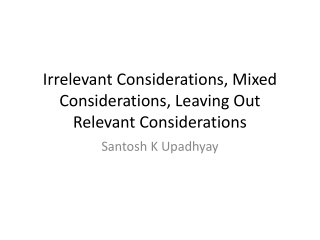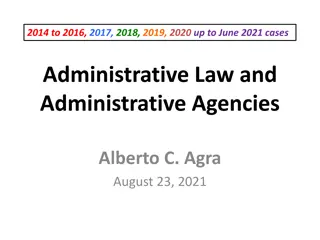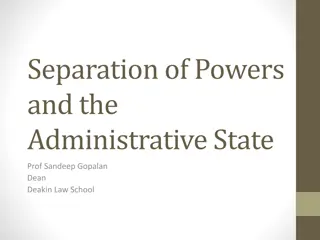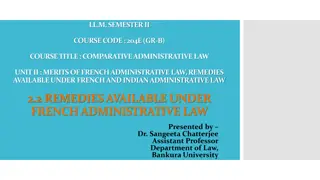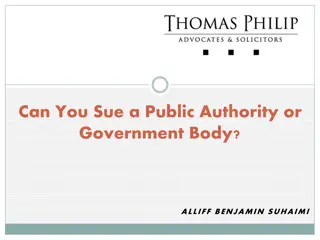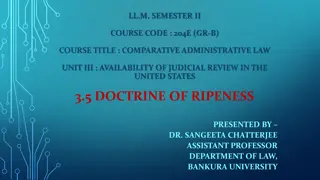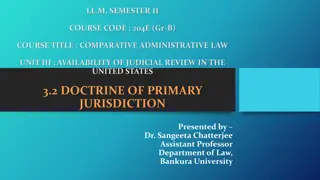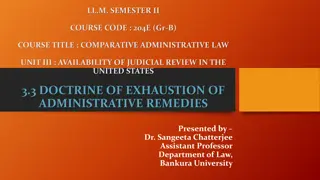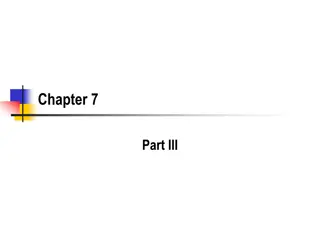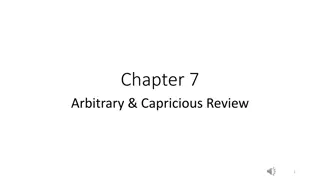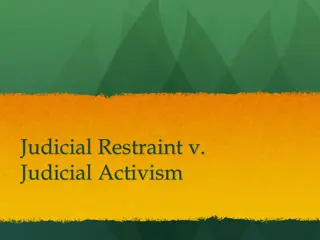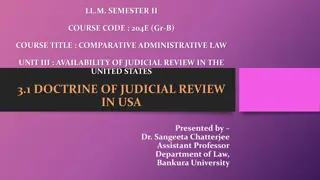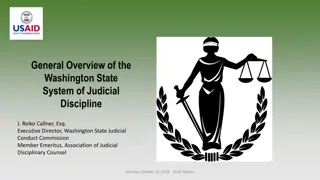Understanding Judicial Review of Administrative Discretion
Judicial review of administrative discretion aims to ensure that public authorities act within the bounds of their statutory powers and in the public interest. Courts do not act as appellate bodies but review decisions to ascertain proper consideration of relevant facts and absence of extraneous influences. While courts do not delve into the merits of administrative decisions, they scrutinize the legality and justifiability of the exercise of discretion. The principle of reason and law guides the exercise of administrative discretion, preventing arbitrary or unfettered use of power.
Download Presentation

Please find below an Image/Link to download the presentation.
The content on the website is provided AS IS for your information and personal use only. It may not be sold, licensed, or shared on other websites without obtaining consent from the author. Download presentation by click this link. If you encounter any issues during the download, it is possible that the publisher has removed the file from their server.
E N D
Presentation Transcript
Nature, Scope and Extent of Judicial Review of Exercise of Administrative Discretion Santosh K Upadhyay Santoshupadhyay.jnu@gmail.com
Nature and Scope of Judicial Review of the Exercise of Administrative Discretion The pattern of judicial review of exercise of administrative discretion seems to balance the following two values. 1. Since the discretion has been conferred upon the concerned public authority under the statute and not upon the Courts, Courts have no power to hear appeals against the decision of the Authority. This discretion must be of the authorities and not of the Courts. 2. It is normal presumption that Legislature is always intended that Authority would exercise the discretion for the purpose and in accordance with the policy prescribed in the statute. There is an inherent presumption that discretion should be exercised for the public purposes and in the public interest. From this point, courts get their jurisdiction to impose legal bounds even to the most general discretionary powers.
Contd. Courts are not the appellate forum where correctness of the order can be challenged but they are only review forum to enquire whether the discretion has been exercised by giving proper consideration to relevant facts and in bonafide manner. That it must not be affected by extraneous considerations. Courts can compel the authority to exercise the discretion by applying his/her mind but it can not specify its own choice indicating the ultimate outcome of the discretion.
Courts do not go into the merits of the exercise of the administrative discretion. Courts do not determine the subjective satisfaction of the Authority exercising discretion. It does not mean administrative discretion is completely beyond judicial scrutiny. The exercise of discretionary power is not uncontrolled and there is no concept of absolute or unfettered exercise of statutory discretion. that exercise of the
Absolute power is anathema under our constitutional order and naked and arbitrary exercise of power is bad in law Krishna Iyer J. The power to exercise discretion does not mean the power to exercise discretion arbitrarily or exercise it on extraneous or irrelevant considerations or not to exercise discretion. Discretion means to discern between right and wrong. Therefore the person having the discretionary power is bound by the rule of reason and law. Based on these general understandings, Courts have evolved many criteria and standards to check the proper legal exercise of the discretion. But the final point is well settled that Court does not sit in appeal against the determination of the authorities and it only sits in review. It reviews the legality and justiciability of the exercise of the discretion but it does not substitute its own choices against the choices of the concerned authority.
Cases: J R Raghupati v. State of A.P. (In the case Material) Vice Chancellor v S K Ghosh Mansukh Lal Vitthal Das v State of Gujrat State of Gujrat v. Jamnadas
Some important statements from J R Raghupathy case (in case material) On the one hand, where Parliament confers power upon some minister or other authority to be used in discretion, it is obvious that the discretion ought to be that of the designated authority and not that of the court. Whether the discretion is exercised prudently or imprudently, the authority s word is to be law and the remedy is to be political only. On the other hand, Parliament cannot supposed to have intended that the power should be open to serious abuse. It must have assumed that the designated authority would act properly and responsibly, with a view to doing what was best in the public interest and most consistent with the policy of the statute. It is from this presumption that the courts take their warrant to impose legal bounds on even the most extensive discretion. (Pp. 103, second paragraph, case material)
Contd. Administrative instructions, rules or manuals, which have no statutory force are not enforceable in court of law. Though for breach of such instructions, the public servant may be held liable by the state and disciplinary action may be taken against him, a member of the public who is aggrieved by the breach of such instructions cannot seek any remedy in the courts. The reason is, that not having the force of law, they cannot confer any legal rights upon any body, and cannot therefore be enforced even by writs under article 226......[But] even though a non statutory rule, bye law or instruction may be changed by the authority who made it, without any formality and it cannot ordinarily be enforced through a Court of law, the party aggrieved by its non-enforcement may nevertheless, get relief under article 226 of the constitution where the non-observance of the non-statutory rule or practice would result in arbitrariness or absence of fairplay or discrimination, particularly where the authority making such non-statutory rule or the like comes within the definition of State under article 12. (pp. 96, 7thline from up, case material) On status of non-statutory guidelines, manuals, instructions
Contd. The authority in which discretion is vested can be compelled to exercise that discretion, but not to exercise it in any particular manner. In general, discretion must be exercised only by the authority to which it is committed. That authority must genuinely address itself to the matter before it: it must not act under the dictation of another body or disable itself from exercising discretion in each individual case. In the purported exercise of its discretion it must not do what it has been forbidden to do, nor must it do what it has not been authorised to do. It must act in good faith, must have regard to all relevant considerations and must not be swayed by irrelevant considerations, must not seek to promote purposes alien to the letter or to the spirit of the legislation that gives it power to act, and must not act arbitrarily or capriciously. Nor where a judgment must be made that certain facts exist can discretion be validly exercised on the basis of an erroneous assumption about those facts. These several principles can conveniently be grouped in two main categories: (i) failure to exercise a discretion, and (ii) excess or abuse of discretionary power. The two classes are not, however, mutually exclusive. Thus, discretion may be improperly fettered because irrelevant considerations have been taken into account; and where an authority hands over its discretion to another body it acts ultra vires. (pp. 97-98, case material)


